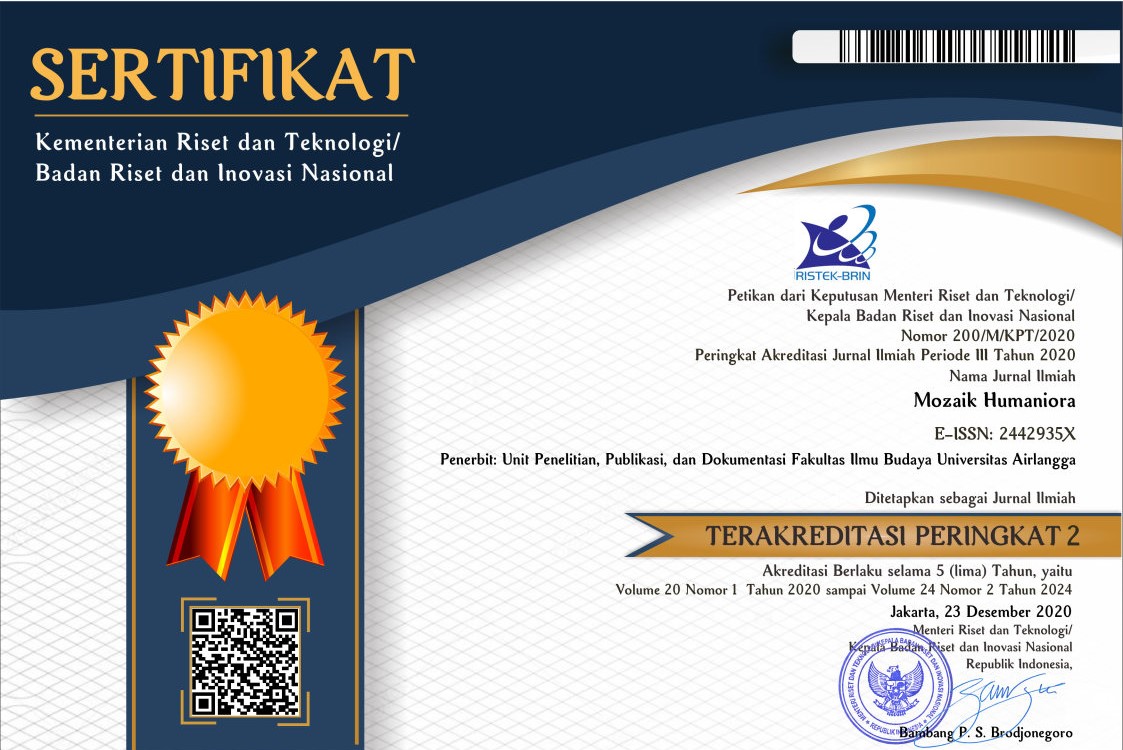Analisis Generation Gap dan Kafkaesque Modern dalam Film A Coffee in Berlin (Generation Gap and Modern Kafkaesque Analysis in A Coffee in Berlin Movie)
Downloads
Abstrak
Setelah Chlöe Swarbrick, seorang politikus asal New Zealand mengungkapkan frasa ‘OK Boomer' pada pidatonya mengenai perubahan iklim, frasa tersebut marak digunakan di sosial media dalam menanggapi isu perbedaan opini dan pandangan antar generasi. Dalam memahami isu tersebut dibutuhkan pemahaman mengenai fenomena generation gap. Fenomena tersebut tercemin dalam film A Coffee in Berlin (2014) karya Jan-Ole Gerster yang menjadi korpus dalam penelitian. Penelitian ini bertujuan untuk menjelaskan aspek pembentuk generation gap dalam film serta kaitannya dengan unsur kafkaesque lalu menghubungkan keduanya dengan simbolisme kopi. Fokus penelitian ini terletak pada interaksi the silent generation, baby boomer dan millennials dan dampaknya terhadap Niko Fischer, tokoh utama dalam film, sebagai milenial. Teori generasi oleh Karl Mannheim, metode kualitatif dengan cara tinjauan pustaka serta pendekatan semiotika digunakan untuk mencari makna dari percakapan dan adegan dalam film. Hasil penelitian menunjukan bahwa fenomena generation gap dalam film mengandung dua relasi kuasa yang berbeda yaitu berupa kekecewaan dan harapan baru bagi milenial. Terdapat pula simbolisme kopi dalam film. Dalam konteks generation gap, kopi menyimbolkan harapan baru bagi generasi muda. Sedangkan dalam konteks kafkaesque kopi tersebut menyimbolkan ironi dan perasaan frustasi untuk mendapatkan sesuatu yang diinginkan
Kata kunci: Generation Gap, A Coffee in Berlin, Kafkaesque Modern, Kopi
Abstract
Since Chlöe Swarbrick, a politician from New Zealand stated the phrase ‘OK Boomer' in her speech about the climate change, the phrase is now widely used in social media in response to the issue of differences of opinion and views between generations. To understand this issue, we need to understand the phenomenon of generation gap. This phenomenon is reflected in the film A Coffee in Berlin (2014) by Jan-Ole Gerster, which becomes a corpus of this research. This research aims to explain the aspects behind the generation gap phenomenon and its relation to kafkaesque elements with coffee as the media to symbolize both. This research will focus on the generation gap phenomenon between the silent generation, baby boomers, and millennials, as well as the impact felt by Niko Fischer, the main character in the film, as a millennial. Theory of Generations by Karl Mannheim, qualitative methods, literature review and semiotics approach are used to find the meaning from conversation and scences in the film. The results show that the generation gap phenomenon contains two different power relations in the form of dissapointment and new hope for millennials. The generation gap and kafkaesque situations are displayed through coffee symbolism in the film. In the context of the generation gap, coffee symbolizes new hope for younger generation. In the context of kafkaesque, it symbolizes irony and the frustation of obtaining something that is desired.
Keywords: Generation Gap, A Coffee in Berlin, Modern Kafkaesque, Coffee

Mozaik Humaniora is licensed under a Creative Commons Attribution-ShareAlike 4.0 International License. Both authors and Mozaik Humaniora agree with the following attribution of journal:
1. Copyright of this journal is possession of Author, by the knowledge of the Editorial Board and Journal Manager, while the moral right of the publication belongs to the author.
2. The journal allows the author(s) to retain publishing rights without restrictions
3. The legal formal aspect of journal publication accessibility refers to Creative Commons Attribution Share-Alike (CC BY-SA).
4. The Creative Commons Attribution Share-Alike (CC BY-SA) license allows re-distribution and re-use of a licensed work on the conditions that the creator is appropriately credited and that any derivative work is made available under "the same, similar or a compatible license”. Other than the conditions mentioned above, the editorial board is not responsible for copyright violation.


















